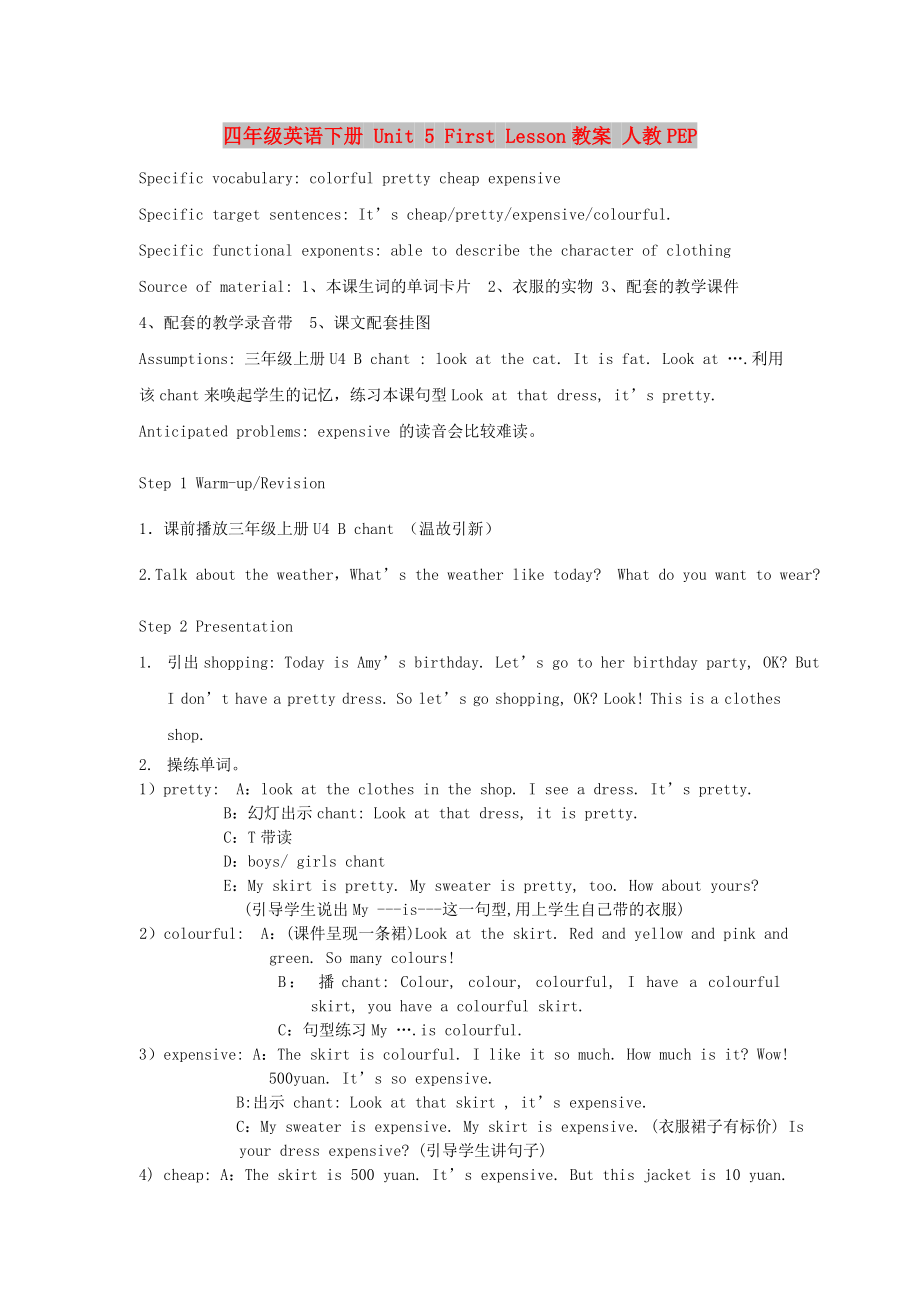《四年級(jí)英語(yǔ)下冊(cè) Unit 5 First Lesson教案 人教PEP》由會(huì)員分享,可在線閱讀�����,更多相關(guān)《四年級(jí)英語(yǔ)下冊(cè) Unit 5 First Lesson教案 人教PEP(3頁(yè)珍藏版)》請(qǐng)?jiān)谘b配圖網(wǎng)上搜索��。
1�、四年級(jí)英語(yǔ)下冊(cè) Unit 5 First Lesson教案 人教PEP
Specific vocabulary: colorful pretty cheap expensive
Specific target sentences: It’s cheap/pretty/expensive/colourful.
Specific functional exponents: able to describe the character of clothing
Source of material: 1、本課生詞的單詞卡片 2�、衣服的實(shí)物 3、配套的教學(xué)課件
4����、配套的教學(xué)錄音帶 5、課
2���、文配套掛圖
Assumptions: 三年級(jí)上冊(cè)U4 B chant : look at the cat. It is fat. Look at ….利用該chant來(lái)喚起學(xué)生的記憶�,練習(xí)本課句型Look at that dress, it’s pretty.
Anticipated problems: expensive 的讀音會(huì)比較難讀�。
Step 1 Warm-up/Revision
1.課前播放三年級(jí)上冊(cè)U4 B chant (溫故引新)
2.Talk about the weather,What’s the weather like today? What do you
3、 want to wear?
Step 2 Presentation
1. 引出shopping: Today is Amy’s birthday. Let’s go to her birthday party, OK? But I don’t have a pretty dress. So let’s go shopping, OK? Look! This is a clothes shop.
2. 操練單詞��。
1)pretty: A:look at the clothes in the shop. I see a dress. It’s pretty.
B:
4�����、幻燈出示chant: Look at that dress, it is pretty.
C:T帶讀
D:boys/ girls chant
E:My skirt is pretty. My sweater is pretty, too. How about yours?
(引導(dǎo)學(xué)生說(shuō)出My ---is---這一句型,用上學(xué)生自己帶的衣服)
2)colourful: A:(課件呈現(xiàn)一條裙)Look at the skirt. Red and yellow and pink and green. So many colours!
5��、
B: 播chant: Colour, colour, colourful, I have a colourful skirt, you have a colourful skirt.
C:句型練習(xí)My ….is colourful.
3)expensive: A:The skirt is colourful. I like it so much. How much is it? Wow! 500yuan. It’s so expensive.
B:出示 chant: Look at that skirt , it’s expensive.
6�、 C:My sweater is expensive. My skirt is expensive. (衣服裙子有標(biāo)價(jià)) Is your dress expensive? (引導(dǎo)學(xué)生講句子)
4) cheap: A:The skirt is 500 yuan. It’s expensive. But this jacket is 10 yuan. It’s cheap.
5) 比較cheap和expensive (出示有標(biāo)價(jià)的兩種東西����,問(wèn)which is cheap/expensive?)
Step 3 games
1.Games :listening and saying.
7、 準(zhǔn)備本課單詞及衣服單詞����,同位一份。老師讀句子�,學(xué)生抓單詞并說(shuō)句子,如T says “the dress is pretty”, Ss should catch “dress” and “pretty”, and stand up. (舉得最快的組要讀出整個(gè)句子)
2.Guessing game: Just now I bought a pretty skirt. But I don’t have gift for Amy. Let’s go to the gift shop. Oh, they’re special. Can you guess which one is pretty/ex
8����、pensive? (設(shè)置surprise, 古董文物A不好看,但是很貴; 女孩背影B很漂亮但實(shí)際臉長(zhǎng)滿皺紋)(有整個(gè)小組來(lái)討論,猜出答案)
Step 4 Conclusion
1. It’s a pity. The gifts are not good. Em---Yes, I have a great idea! I can send Amy some flowers. (實(shí)物) Look! The flowers are colourful and pretty. They’re cheap. They ‘re not expensive.
2. sing a song: I
9、send the flowers to Amy .She must be very happy. Look! Amy is pretty .(課件)It’s her birthday. Let’s sing a song for her. (生日歌 + 同樣曲子套上本課所學(xué)內(nèi)容)
3. Let’ s chant: 3.Today we learn “ Unit 5 How much is it ”
chant 播一次, 用實(shí)物來(lái)幫助理解, 兩組問(wèn)兩組答, 共同完成chant��。
Step 5 Homework
1.聽本課錄音3次。2.用本課句子介紹兩件自己的衣物�。
附送:
20
10、19-2020年四年級(jí)英語(yǔ)下冊(cè) Unit 5 Lesson Fifth教案 人教PEP
Specific vocabulary: size, take, a pair of,son.
Specific target sentences: A pair of …for….What size? How much are they? We’ll take them.
Specific functional exponents: 能詢問(wèn)價(jià)格并簡(jiǎn)略評(píng)價(jià)��。
Source of material: B Let’s talk Group work C Let’s check
Assumptio
11���、ns:
Anticipated problems:
學(xué)生分析:學(xué)生在上一課時(shí)已經(jīng)學(xué)習(xí)了鞋子的名稱���,這節(jié)課在句型中繼續(xù)鞏固詞組a pair of….在這節(jié)課中A pair of …for…是難點(diǎn),在教學(xué)法中要注意��。What size? Size ftve.注意英美兩國(guó)與我國(guó)的衣物尺碼標(biāo)記的差異����。
Step 1:Warm-up/Revision
1、Let’s do
教師發(fā)出口令�,孩子聽到口令后出示圖片并做出相應(yīng)的動(dòng)作。
2�、學(xué)生說(shuō)唱本單元的歌謠。
(設(shè)計(jì)意圖:用chant調(diào)節(jié)課堂氣氛���,讓學(xué)生在輕松的節(jié)奏中感知本單元的知識(shí)點(diǎn)�����。A)
3��、出示一些實(shí)物復(fù)習(xí)句型:How m
12��、uch is it? It’s…yuan.再出示一些復(fù)數(shù)的物品�����,教學(xué)How much are they? They’re….
(設(shè)計(jì)意圖:通過(guò)復(fù)習(xí)學(xué)過(guò)的內(nèi)容,為新授課作準(zhǔn)備��。A)
Step 2:Presentation :
1���、教師出示Let’s learn部分的掛圖,讓孩子表演圖中的情景����,教師與學(xué)生共同表演對(duì)話。教師挑出兩雙鞋�����,一雙適合自己的腳���,另一雙或大或小��,然后讓學(xué)生猜哪一雙是自己的鞋����。學(xué)生猜過(guò)兩三次后,教師告訴學(xué)生:I take size 38 sneakers. Which pair is mine? Please guess! 學(xué)生猜出后���,教師問(wèn)學(xué)生:What size d
13�����、o you wear���?指導(dǎo)學(xué)生回答:Size …。教學(xué)What size����?Size …。教學(xué)再用句型問(wèn)兩��、三個(gè)同學(xué):
T:What size do you wear��?
Ss: Size …
T: How much are they ?
Ss: They’re…yuan.
2����、教師指導(dǎo)學(xué)生做以上的問(wèn)答練習(xí)���,進(jìn)行小組匯報(bào)。
3��、出示掛圖讓學(xué)生猜圖意��。
4�����、觀看課件并回答問(wèn)題�����。What size does John wear? How much are they?
(設(shè)計(jì)意圖:通過(guò)讓學(xué)生裝猜圖意��,培養(yǎng)學(xué)生的猜測(cè)能力���,通過(guò)讓學(xué)生帶著問(wèn)題聽對(duì)話,師生問(wèn)答自然引出新句型�����,培養(yǎng)學(xué)生的聽力
14��、。R)
5��、學(xué)生跟錄音朗讀課文�,教師指導(dǎo)學(xué)生朗讀。學(xué)生分角色朗讀對(duì)話���。進(jìn)行Pair work�����,分組表演�。
(設(shè)計(jì)意圖:通過(guò)跟讀�,小組練習(xí),讓學(xué)生表演��,提高學(xué)生學(xué)習(xí)的興趣����。A)
6、Group work:
教師為學(xué)生布置任務(wù)���,完成書中的表格����。學(xué)生通過(guò)詢問(wèn)小組成員:How much are your jeans/…?的交流活動(dòng),在實(shí)際的生活中運(yùn)用語(yǔ)言����。學(xué)生完成表格后,再以對(duì)話的方式向同學(xué)們匯報(bào)�����。
(設(shè)計(jì)意圖:通過(guò)調(diào)查完成表格��,對(duì)本節(jié)課的重點(diǎn)句型進(jìn)行有效復(fù)習(xí)��,并鼓勵(lì)學(xué)生把聽到的對(duì)話用自己的語(yǔ)言來(lái)轉(zhuǎn)述���,對(duì)本課的內(nèi)容進(jìn)行拓展。R)
Step 3 Practice :
活動(dòng):買鞋
15�、教師為學(xué)生準(zhǔn)備寫有各種要求的卡片,如:≤50yuan?? sandals?? size 36….
活動(dòng)時(shí)���,學(xué)生兩人一組進(jìn)行���,其中一個(gè)抽卡片決定要買的鞋,讓后運(yùn)用學(xué)過(guò)的語(yǔ)言知識(shí)進(jìn)行交際���,并買到要求的鞋���。描述買到的鞋向大家匯報(bào)�����,買對(duì)�、并匯報(bào)正確的加兩分�,最后評(píng)出優(yōu)勝組,獎(jiǎng)勵(lì)��。
(設(shè)計(jì)意圖:通過(guò)這個(gè)活動(dòng)鞏固所學(xué)的新句型���,同時(shí)激發(fā)學(xué)生的學(xué)習(xí)興趣�。R)
Step 4:Add-activities
1����、Let’s check
2.同步練習(xí)冊(cè)
(設(shè)計(jì)意圖:用Let’s check訓(xùn)練學(xué)生的聽力,并檢測(cè)學(xué)生對(duì)這個(gè)單元的掌握情況��。C)
Step 5: Homework:
向家長(zhǎng)聽���、讀錄音三次��。
跟你的好朋友表演對(duì)話�。
 四年級(jí)英語(yǔ)下冊(cè) Unit 5 First Lesson教案 人教PEP
四年級(jí)英語(yǔ)下冊(cè) Unit 5 First Lesson教案 人教PEP

